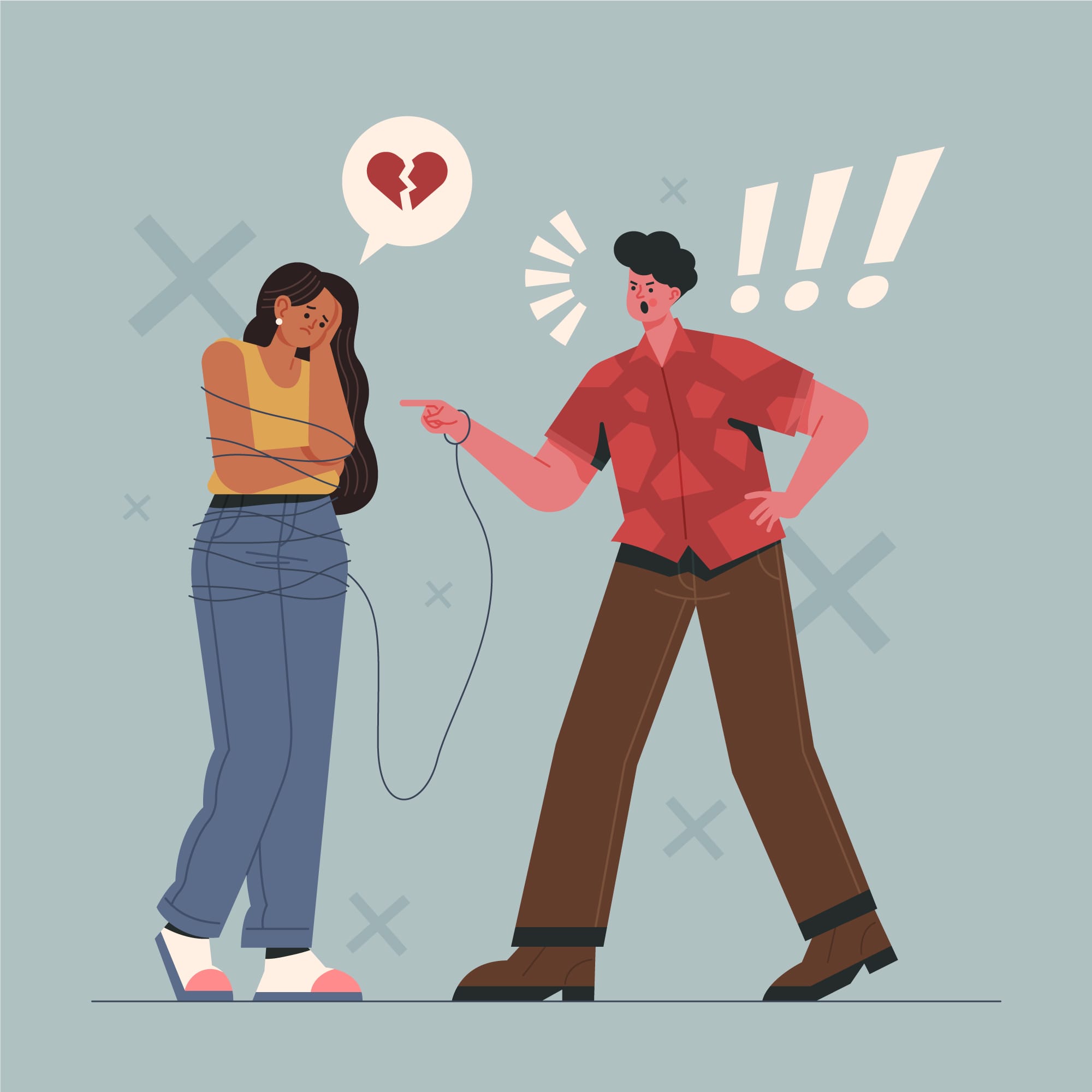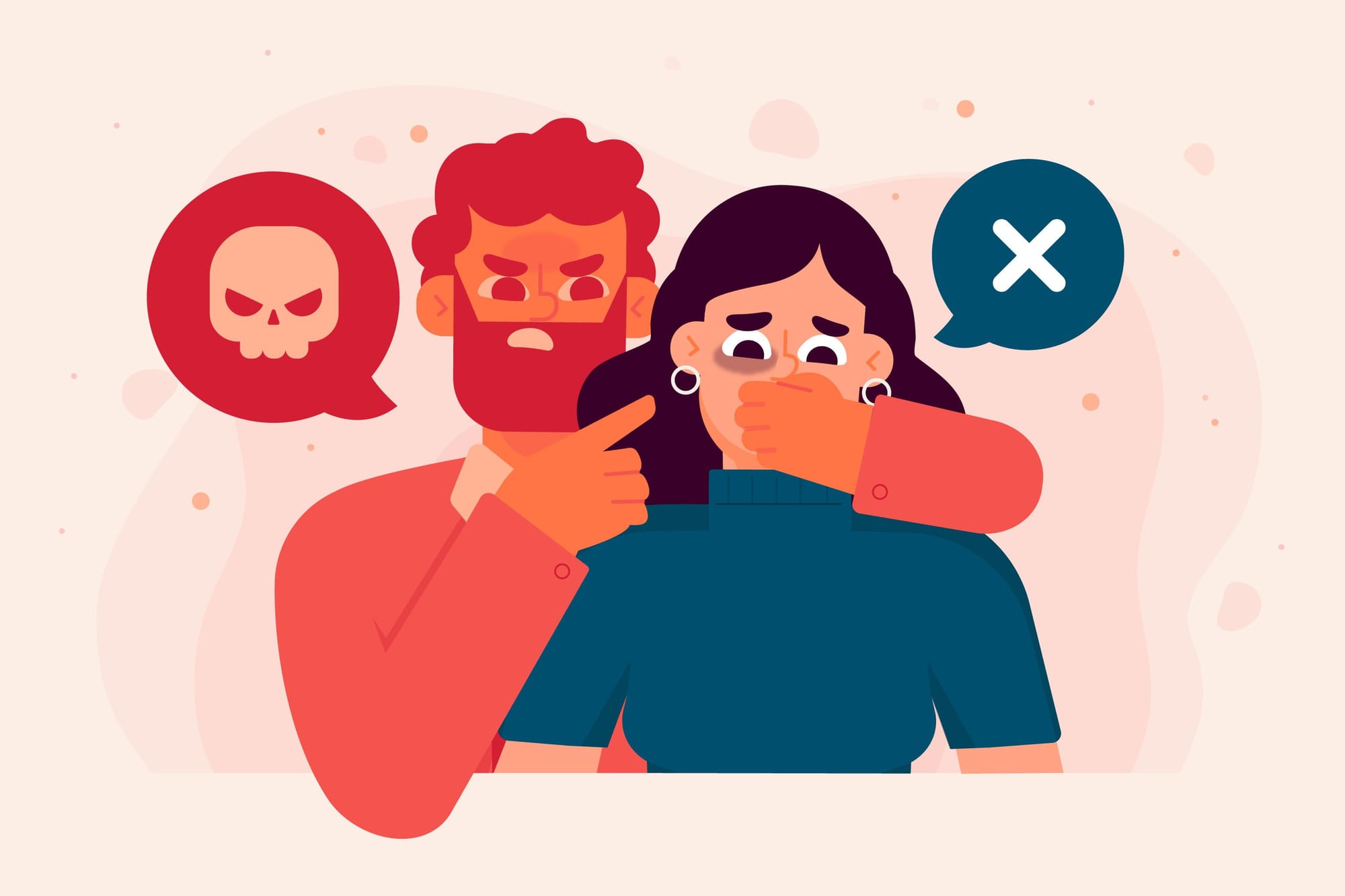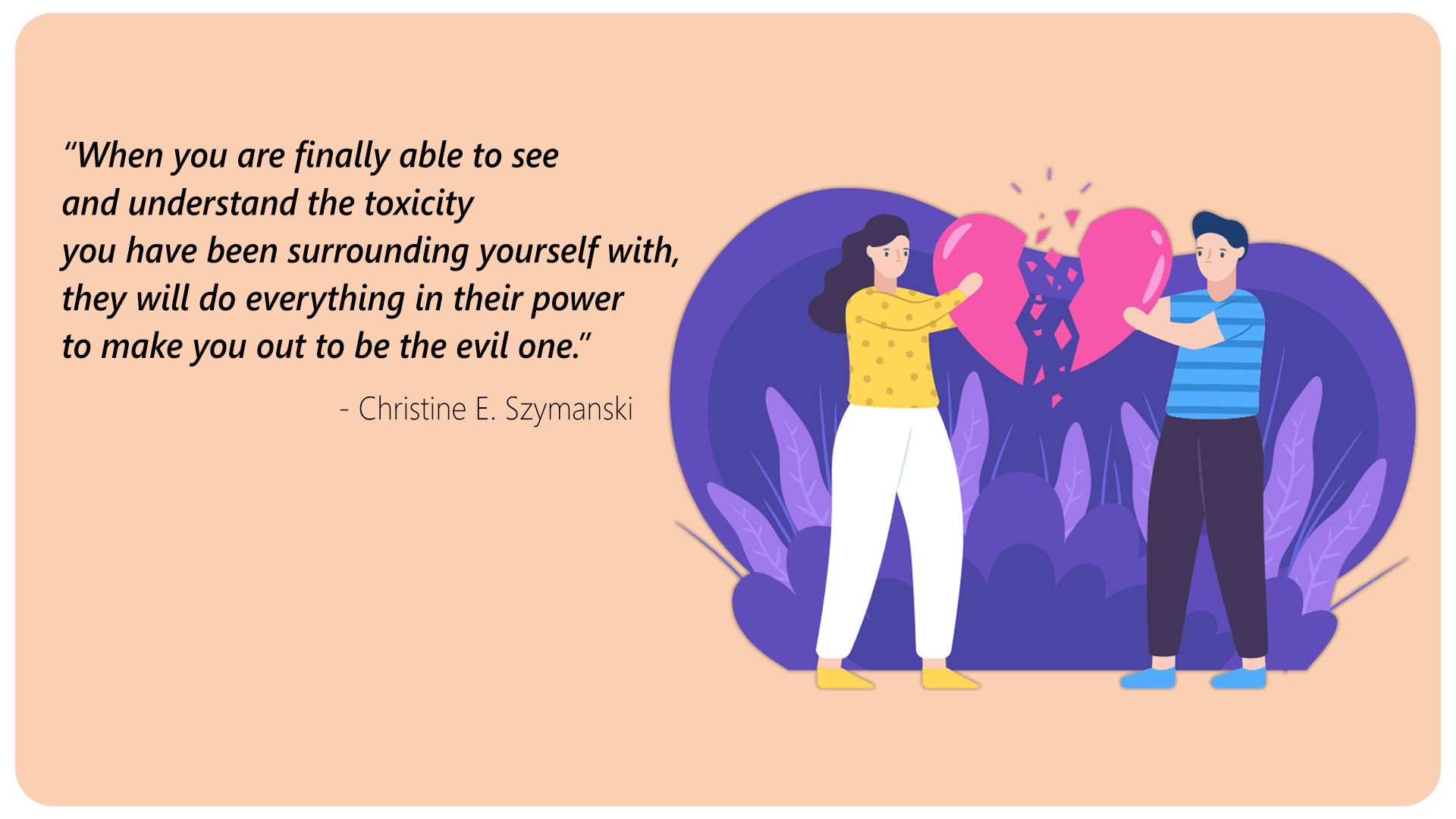
We've all heard of the term, but what does a "toxic relationship" mean? Relationships are part of life, shaping our experiences, emotions, and overall well-being. However, when a relationship becomes toxic, then it may turn from an enriching source to one of stress, anxiety, and unhappiness. It is good to know the signs of a toxic relationship with a partner, a friend, or even a family member and how to deal with the same in consideration of one's mental and emotional health.

In this article, we delve into toxic relationships, some of the most common signs and behaviors defining them, and practical steps to be taken so that should you find yourself in one, you know what to do. We shall also touch briefly on how to mend your life to get on with building it after having escaped a toxic relationship.
What Is a Toxic Relationship?

A toxic relationship is one in which the negative interactions tend to overshadow all the positive ones. It's a kind of potential behavior pattern that might turn out to hurt either one or both people, emotionally, mentally, or even physically. While all relationships have their ups and downs, toxic relationships are consistently draining and damaging, leaving individuals feeling worse off than before.
In a toxic relationship, mutual respect and understanding are dwindling qualities no less than support. Rather than serving as supportive sources of light in each other's lives, the individuals in the relationship unknowingly, or even knowingly, bring one another down. This can happen in romantic relationships, friendships, or even families.
There are many signs of a toxic relationship

Constant Criticism: One partner can constantly criticize the other. Rather than being constructive, it feels quite biting and is meant to hurt the other partner's ego.
Support is the foundation on which a relationship stands. On the other hand, support in a toxic relationship is either missing or conditional. An example could be that you feel like he or she does not have your back or supports you only when it is favorable for them.
- Issues of control: one may attempt to regulate the activities or decisions of the other, and in some cases, thoughts and feelings. Though the degree of control may be subtle, the feeling left for the controlled partner is one of entrapment and powerlessness.
- Jealousy and Insecurity: A little bit of jealousy is normal in all relationships, though extreme amounts of it can be a sign of toxicity. What if your partner is totally suspicious, accusing you without any facts, or trying to isolate you from others? These are big red flags.
- Blaming and Gaslighting: Toxic people never wish to be responsible for their actions but are quick to throw the blame on their partner for all that is wrong. Gaslighting is a common tool in toxic relationships, whereby one person manipulates the other into doubting their own reality or feelings.
- Emotional Manipulation: Emotional manipulation can be realized through guilt trips, playing the victim, or emotional blackmail to get what they want. It is otherwise a method of control of one over the other.
- Disrespect and Dismissal: If your feelings, opinions, and boundaries are often dismissed by your partner or friend, that is nothing but disrespectful. Over time, it erodes your self-esteem and sense of self-worth.
- Constant Drama: At the core of any toxic relationship lies constant drama—multiple arguments and crises, along with emotional outbursts. One could call it an emotional roller coaster, the downs being a multitude more than the ups.
- Isolation: Toxic partners tend to isolate their victims from their friends, family, or system of support. They could make you feel guilty for going out with your friends, or worse, trash-talk the people you care about to create distance.
- Drained: Probably the best indicator of whether a relationship is toxic is how you feel after being with that person. If you regularly feel emotionally exhausted, anxious, or depressed, it's likely that this relationship is gnawing away at your well-being.
Types of Toxic Relationships

There are several types of toxic relationships. They can occur with a romantic partner, a friend, a family member, or even a co-worker. Here are a few:
- Romantic Relationships: These are probably what people talk about most often when they refer to toxicity. Inside romantic relationships, it can manifest as possessive behavior, emotional abuse, infidelity—just about anything.
The level of potential danger in a toxic friendship can be almost equal to that of a toxic romantic relationship. A toxic friend can be over-competitive, backbite, or even use you for something.
- Family: Family dynamics themselves can be toxic, especially with a history of manipulation, guilt-tripping, or invasion of personal boundaries. A toxic family might use their relationship with you for control or belittling.
- Work: Toxicity does not limit itself to your personal life; it can be extended further to working relationships. A toxic boss or co-worker might create a hostile work environment, undermine your efforts, or even engage in workplace bullying.
Mental Health Implications of Toxic Affairs

Toxic relationships will deeply impact and create irreparable damage to one's brain health. Here is how the impact can be had:
- Anxiety and Depression: High levels of stress come about from the unending cases of conflicts and emotional abuse, resulting in anxiety and depression. You might find yourself always on the edge, anxious about the next conflict, or feeling like there is no escape.
- Low self-esteem: In most cases, toxic relationships strip parts of one's self-esteem. Criticism or badmouthing is hard not to internalize when heard over and over, so it is quite easy for someone to start believing those messages about themselves.
- Loss of identity: Toxic relationships, especially controlling or manipulative ones, do make one lose touch with themselves quite easily. You might end up sacrificing what you are interested in and what you value, or even the friendships you have, just to have peace.
- Physical Health Problems: Physically, stress from a toxic relationship can be manifested in headaches, problems sleeping, fatigue, and even more dangerous health issues that originate from chronic stress.
- Trust Issues: It's difficult for one to trust again after being in a toxic relationship. A person can be more careful, suspicious, or even afraid of bonding with someone new.
- Emotional Exhaustion: It's easy to get emotionally drained when there's constant drama and conflict, and people in toxic relationships often feel that way. It leaves little emotional energy to do or give to anything or anyone else.
- Fear of Being Alone: Many people stay in toxic relationships for fear of being alone, scared to death. They may feel that being in a bad relationship is better than staying alone or that they will never find someone again.
- Emotional Attachment: Toxic relationships can also have emotional attachment, which makes it hard to leave because of the good moments, memories, or the hope that things will get better.
- Low Self-Esteem: A person with low self‐esteem may think that they deserve no better or a toxic relationship is what they can get. Financial Dependence: Sometimes, one of the partners may be tied financially to the other, hence making it very hard to leave the toxic relationship.
- Children: Often, the reason for remaining in a toxic relationship is the inability to leave the partner when children are involved. Most people feel that for the children's sake, they are better off being raised together, no matter how unhealthy the relationship.
- Hope for Change: Many people believe that he/she will change, given the numerous times they have seen good behavior and promises to be better, among others.
- Manipulative: They are very manipulative. They can tell you that you are the problem, that you'll never find anybody better, or that you will not survive without them.
How To Deal With A Toxic Relationship

Being in one, you need to take steps to ensure your mental and emotional well-being. This you can do by:
- Admit the Problem: Solving this problem starts with admitting the fact that the relationship is bad. This is really a lot easier said than done, especially in the event you have been a victim of gaslighting or manipulation into thinking you are the one who has issues.
- Set Boundaries: Boundaries are very important to toxic relationships. Let the other individual understand what you will not accept from them and what taking those liberties will mean for them.
- Seek Support: You don't have to do all this with a toxic relationship alone. Share with your friends, relatives, or even the therapist—all your support furthers the strength and perspective in discussions with someone who understands.
- Focus on Self-Care: Always prioritize your well-being. Do things that make you feel good. Spend time with supportive people, and see to it you take care of your health.
- Limit Contact: You should limit yourself from contacting the toxic person whenever possible. It is very difficult, of course, if the person is a family member or a person you are doomed to meet every day. Reducing their influence in your life is an important thing to do.
- Consider Professional Help: If the toxic relationship is too deep or entails too much emotional abuse, it may be time to get someone who is a professional in issues of relationship therapy.
When to Leave a Toxic Relationship

It might not be wise to stay in one's shoes if this is a hard decision to make, because staying in toxic relationships can end in grievous harm. Here are some of the signs:
- There Is No Betterment: The relationship is still stuck, and there's no betterment in sight. The toxic behavior is consistent, and nothing has been able to change in that relationship.
- Physical or Emotional Abuse: If the relationship involves any form of abuse—be it physical, emotional, or verbal, it becomes absolutely necessary to leave the relationship. Abuse is not considered normal behavior, and your safety should be highly advocated for.
- Severe and Constant Stress and Anxiety: If the relationship brings more stress and anxiety to you, it shows all the signs that it's time to call it a day.
- Loss of Self: In the relationship, when you feel one has lost his or her sense of self, it is high time that you leave and rediscover yourself outside such a toxic relationship.
- Impact on Other Life Areas: When the relationship starts to impact other necessary areas of life negatively, like work, friendships, or even mental health, it's a good sign that it's time to let go.
- Unwillingness to Change: If one's partner or friend is unwilling to acknowledge the problems or attempt any change, the possibility of an improved relationship is slim.
How to Heal from a Toxic Relationship

Leaving a toxic relationship is the first step to healing. Here is how to rebuild your life once again:
- Allow yourself to grieve: Even if a relationship is toxic, a sense of loss is normal. Grieve the relationship and the future you saw yourself in.
- Rebuilding Your Self-Esteem: In most cases, a toxic relationship will leave one feeling that they are not worthy or lovable. Focus on building self-esteem back by surrounding oneself with positivity and engaging in activities through which one will feel great about oneself.
- Reconnecting with Yourself: Take time out to find and redefine yourself outside the relationship. Go back to your old hobbies, interests, and friends that were lost with the rise of the toxic relationship.
- Therapy: You can learn how to deal with your emotions, know the cycle of toxic relationships, and acquire the skills necessary for a healthier relationship in the future.
- Set Healthy Boundaries: As you move forward, it's important that you set and maintain proper boundaries in all your relations. This shall spare you from ever falling into toxic relations.
- Be Patient with Yourself: Healing takes time. Patience will be needed on your part as you work through the emotions and the many challenges that come from leaving a toxic relationship.
FAQs
What are some early signs of a toxic relationship?
Early warning signs are constant criticism, lack of support, controlling behavior, and excessive jealousy. These behaviors often start small but can escalate over time.
Can a toxic relationship be fixed?
At times, the two parties involved can make a toxic relationship better if they really want to change, with the help of therapists. But it completely affects both party's willingness to let go of the issues and solve them together.
Why is it so hard to leave a toxic relationship?
Breaking up is hard either due to strong emotional captivity, fear of loneliness, or low self-esteem catalyzed by the toxic person. Other concerns are more practical: financial dependence, and children.
How to help a friend in a toxic relationship
Be there for them supportively, void of judgment, and be softly insisting on seeking help. Be patient and realize they might not be able to jump ship right away.
What about when it is impossible to avoid a toxic person?
If it is impossible to be totally away from them, establish very clear boundaries and be limited in your time together. Focus on protecting your own mental and emotional well-being.
Conclusion
Toxic relationships are very difficult and do damage; however, if you realize this and take the proper initiative to protect yourself, you will be okay. You'll decide for yourself whether to solve the issues or leave the relationship. Only remember that the health of the mind or the heart should always be on top. Find supportive people, look for professional help if needed, and take your time recovering, and rebuilding your life. Eventually, getting over a toxic relationship should involve the empowerment of your smile, your self-value, and your peace of mind.
" True happiness can be found in the tiniest of things "
If you enjoyed this article, don't miss out on our future content—sign up and subscribe to our newsletter for the latest updates and exclusive insights! We love hearing from you, so feel free to leave your comments down below.





